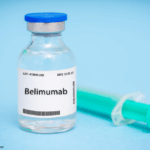A post-hoc analysis of data from two clinical trials showed that nano-encapsulated sirolimus with pegylated-adricase (NASP) may be effective for promoting tophus resolution and lowering serum uric acid in patients with uncontrolled gout.


Michele B. Kaufman, PharmD, BCGP, is a freelance medical writer and editor. She is also a pharmacist at New York Presbyterian Hospital–Lower Manhattan campus. She has been a past guest lecturer at Touro College of Pharmacy in New York City for the Medical Writing elective. Dr Kaufman is a member of the New York City Society of Health-Systems Pharmacy, the New York State Council of Health-System Pharmacists, the Academy of Managed Care Pharmacy (AMCP)—Northeast Region Affiliate Chapter, the American Society of Consultant Pharmacists and the Empire State-Metropolitan NY Chapter of the American Medical Writers Association. She received her BS in Pharmacy from the University of Rhode Island (URI) College of Pharmacy and her Doctor of Pharmacy degree from Massachusetts College of Pharmacy and Allied Health Sciences in Boston. She also completed a Drug Information Fellowship at the URI Drug Information Center/Roger Williams Medical Center in Providence, R.I. Dr Kaufman is a registered pharmacist and is a Board-Certified Geriatric Pharmacist.

A post-hoc analysis of data from two clinical trials showed that nano-encapsulated sirolimus with pegylated-adricase (NASP) may be effective for promoting tophus resolution and lowering serum uric acid in patients with uncontrolled gout.

Based on data from multiple clinical trials, the FDA has approved obinutuzumab for the treatment of adults with lupus nephritis in combination with standard therapy.

Research demonstrating the effectiveness of subcutaneous anifrolumab-fnia as an auto-injector in patients with active systemic lupus erythematosus is the basis of a recent decision in the EU to recommend the treatments approval for this patient population.

Lupus nephritis is one of the leading causes of mortality for patients with systemic lupus erythematosus (SLE), and patients with both SLE and end-stage renal disease have standardized mortality ratios more than 60 times that of patients with SLE with normal kidney function.1 The good news: Rheumatologists now have not one, but two approved options…

In summer 2024, two phase 3 studies were released with promising findings for the treatment of patients with systemic lupus erythematosus (SLE) and those with lupus nephritis. SLE Disease Activity Dapirolizumab pegol is a novel, investigational, Fc-free anti-CD40L agent for people living with moderate to severe SLE.1 The randomized, double-blind, parallel-group PHOENYCS GO trial (N=321)…

In late July 2022, the U.S. Food & Drug Administration (FDA) approved belimumab (Benlysta) for the treatment of children with active lupus nephritis aged 5 to 17 years old receiving standard therapy.1 Despite recent advances in treatment options for patients with systemic lupus erythematosus (SLE), those with kidney involvement may develop endstage renal disease and…
The FDA has issued draft guidance recommending that all biosimilar medications be designated as interchangeable with their reference products upon initial FDA approval. A 60-day review and comment period of the draft guidance is now open, and the ACR will soon be submitting comments.

The FDA has accepted a biologics license application for nano-encapsulated sirolimus with pegylated-adricase (NASP), a combination treatment designed to reduce serum uric acid levels in patients with uncontrolled gout.

The FDA as approved the biosimilar treatments denosumab-nxxp (Bildyos) and denosumab-nxxp (Bilprevda) for all indications of denosumab, their reference product, including osteoporosis in postmenopausal women.

The FDA will consider a supplemental new drug application for deucravacitinib for the treatment of adults with active psoriatic arthritis based on promising results from clinical trials.